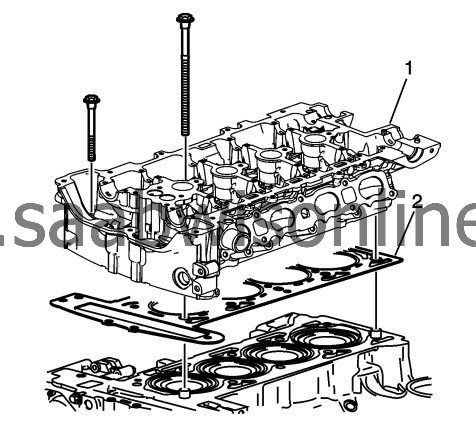Cylinder Head Removal (LDK, LHU)
|
|
Cylinder Head Removal (LDK, LHU)
|
Special Tools
EN-38188
Cylinder Head Broken Bolt Extractor Kit
For equivalent regional tools, refer to
Special Tools (LDK, LHU)
.
|
1.
|
Remove the cylinder head to the block bolts in sequence. Discard the bolts.

|
|
2.
|
 Warning
Warning
|
|
In order to prevent damage to the valves and injectors during cylinder head removal, set the cylinder head on blocks.
|
|
|
|
|
|
Remove the cylinder head (1).

|
|
3.
|
Remove the cylinder head gasket (2).
|
|
4.
|
Clean all of the gasket surfaces.
|
|
5.
|
Use the following procedures when cleaning the cylinder head and cylinder block surfaces:
|
|
|
•
|
Use a razor blade gasket scraper to clean the cylinder head and cylinder block gasket surfaces. Do not scratch or gouge any surfaces.
|
Note
|
|
Do not use any other method or technique to clean these gasket surfaces.
|
|
|
|
•
|
Use a new razor blade for each cylinder head and cylinder block.
|
|
|
•
|
|
Note
|
|
Be careful not to gouge or scratch the gasket surfaces. Do not gouge or scrape the combustion chamber surfaces. The feel of the gasket surface is important, not the appearance. There will be indentations from the gasket left in the cylinder head after all of the gasket material is removed. These small indentations will be filled in by the new gasket.
|
Hold the razor blade as parallel to the gasket surface as possible.
|
|
6.
|
|
Note
|
|
Do not use a tap to clean the cylinder head bolt holes.
|
Clean the old sealer/lube and dirt from the bolt holes.
|
|
7.
|
Clean the fastener holes with a nylon bristle brush.
|
|
8.
|
 Warning
Warning
|
|
Wear safety glasses to avoid injury when using compressed air or any cleaning solvent. Bodily injury may occur if fumes are inhaled or if skin is exposed to chemicals.
|
|
|
|
|
|
When cleaning the cylinder head bolt holes, use a suitable solvent in spray form. Use a compressed-air cleaning pistol with an extra long nozzle to reach the bottom of the holes.
|
|
9.
|
Remove any broken long cylinder head bolts using the
EN-38188
extractor kit .
|



 Warning
Warning

